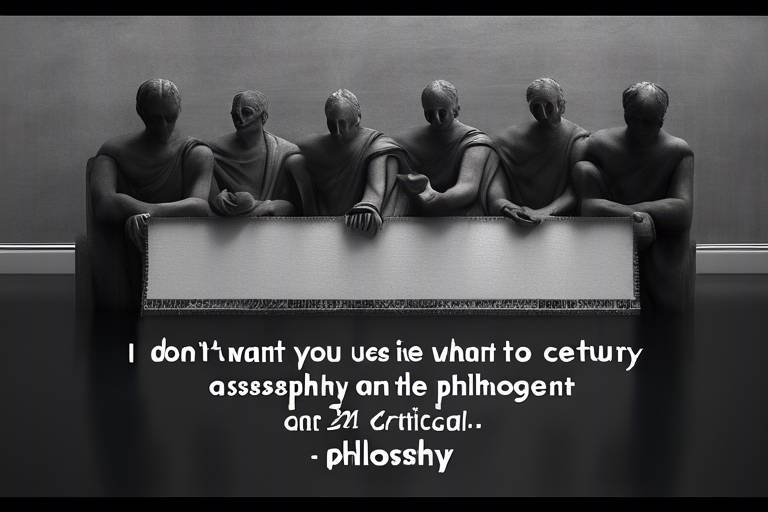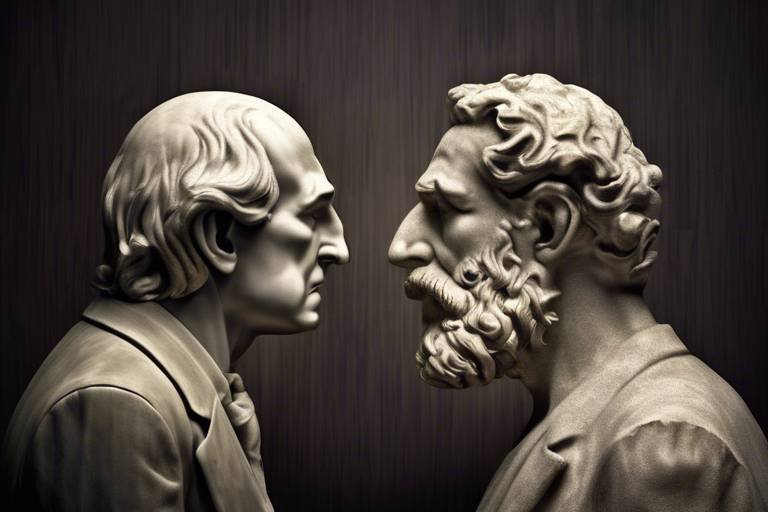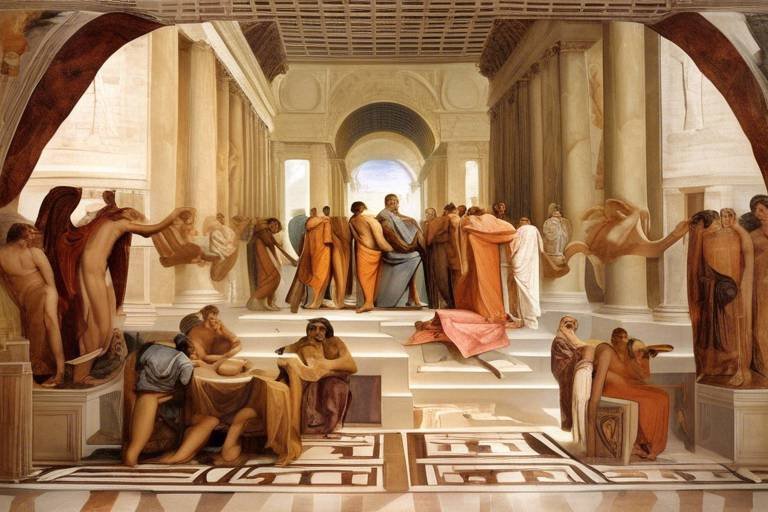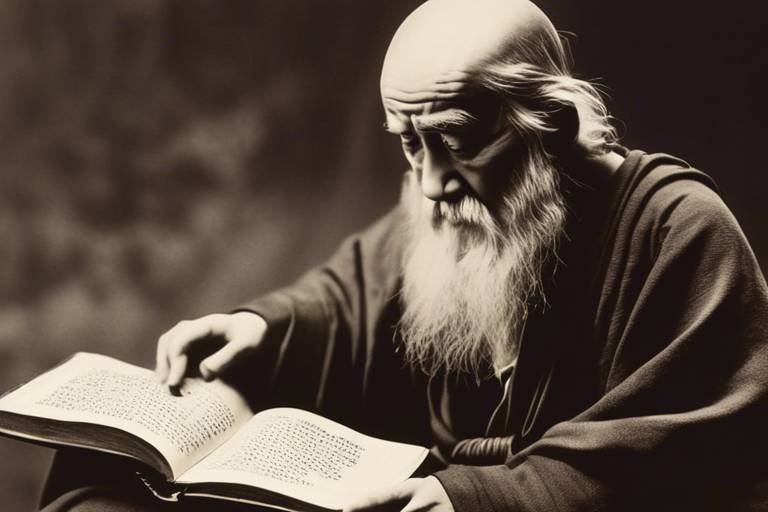How Valuable is A Priori Knowledge?
A priori knowledge is one of those fascinating concepts that often flies under the radar in everyday conversations, yet it's a cornerstone of our understanding of the world. Have you ever thought about how you know certain things without needing to experience them first? For instance, you might know that 2 + 2 equals 4 without ever having to count physical objects. This is the essence of a priori knowledge—it's knowledge that is independent of experience, relying instead on reasoning and logic. The value of a priori knowledge lies not just in its existence but in its ability to shape our understanding across various fields, from mathematics to philosophy, and even science.
In a world where empirical evidence often reigns supreme, a priori knowledge serves as a refreshing reminder that some truths can be known without needing to rely on sensory experiences. This type of knowledge allows us to form the foundational principles that underpin complex theories and arguments. Imagine building a house; a priori knowledge is like the blueprint that guides the construction process. Without it, we might find ourselves lost, trying to figure things out as we go along, which can lead to chaos and confusion.
Consider the implications of a priori knowledge in our daily lives. It helps us navigate through logical reasoning, ethical dilemmas, and even mathematical problems. Whether you’re solving a math equation or contemplating a philosophical question, a priori knowledge provides a framework that allows you to approach these challenges with confidence. This is why understanding its value is crucial—not just for scholars and philosophers, but for anyone who seeks to engage with the world on a deeper level.
Moreover, the significance of a priori knowledge extends beyond the realm of academia. It influences our decision-making processes and shapes our beliefs about the world. For example, when we make assumptions based on prior knowledge without direct evidence, we are engaging in a priori reasoning. This can lead to both positive outcomes, like making quick decisions in urgent situations, and negative consequences, such as falling prey to biases or misconceptions. Thus, it's essential to recognize the dual-edged sword that a priori knowledge can be.
As we delve deeper into the nature of a priori knowledge, it becomes evident that its value is multifaceted. It not only enriches our intellectual pursuits but also enhances our everyday experiences. By understanding how this type of knowledge operates, we can better appreciate its role in shaping our perceptions, beliefs, and ultimately, our reality.
- What is a priori knowledge? A priori knowledge refers to knowledge that is independent of experience, gained through reasoning and logic.
- How does a priori knowledge differ from a posteriori knowledge? A posteriori knowledge is dependent on empirical evidence and experience, while a priori knowledge does not require such evidence.
- Why is a priori knowledge important? It forms the foundation for many theories and principles in philosophy, mathematics, and science, allowing us to understand concepts without direct experience.
- Who are some philosophers associated with a priori knowledge? Key figures include Immanuel Kant and René Descartes, who explored the significance of a priori knowledge in their works.

The Nature of A Priori Knowledge
A priori knowledge is a fascinating concept that has intrigued philosophers and thinkers for centuries. At its core, a priori knowledge refers to knowledge that is independent of experience. This means that we can arrive at certain truths without having to observe or experiment in the physical world. Imagine knowing that 2 + 2 equals 4 without ever having to count objects; this is the essence of a priori knowledge. It is like a mental blueprint that allows us to understand certain principles or truths intuitively, without needing any external validation.
To further grasp the nature of a priori knowledge, we can contrast it with its counterpart, a posteriori knowledge. A posteriori knowledge is dependent on empirical evidence and experience. For example, knowing that it is raining outside requires you to look out the window or step outside. In contrast, a priori knowledge is akin to knowing that all bachelors are unmarried men; this truth is self-evident and does not require observation to validate it. This distinction is crucial because it highlights the different ways we acquire knowledge and understand the world around us.
One of the key characteristics of a priori knowledge is its universality. A priori truths are often considered to be universally valid, meaning they hold true regardless of individual experiences or cultural backgrounds. For instance, the statement "a triangle has three sides" is a priori knowledge that is accepted across various cultures and contexts. This universality gives a priori knowledge a kind of foundational status in our understanding of reality.
Moreover, a priori knowledge is often seen as necessary and certain. This means that once we understand a particular a priori truth, it becomes difficult to refute. For example, the statement "if A equals B and B equals C, then A equals C" is not just a statement; it's a logical necessity. Thus, a priori knowledge provides us with a framework of certainty that can guide our reasoning and understanding in various disciplines, including mathematics, logic, and even ethics.
In summary, the nature of a priori knowledge is characterized by its independence from experience, its universality, and its necessity. It serves as a fundamental pillar in our quest for understanding and knowledge. As we explore the implications of a priori knowledge in various fields, we can begin to appreciate its profound impact on our intellectual landscape.
- What is the difference between a priori and a posteriori knowledge?
A priori knowledge is independent of experience, while a posteriori knowledge relies on empirical evidence. - Can a priori knowledge be proven?
While a priori knowledge is often accepted as self-evident, some philosophers argue about its validity and the means of proving it. - How does a priori knowledge influence scientific theories?
A priori knowledge can inform the development of hypotheses and theoretical frameworks in science, often guiding researchers in their exploration of the unknown.

Philosophical Foundations
A priori knowledge has deep philosophical roots that can be traced back to some of the greatest thinkers in history. Two of the most influential figures in this domain are Immanuel Kant and René Descartes. Their contributions not only shaped the understanding of a priori knowledge but also laid the groundwork for modern philosophy. Understanding their perspectives helps us appreciate the complexities of knowledge itself and how we come to understand the world around us.
Immanuel Kant, for instance, argued that a priori knowledge is essential for making sense of our experiences. He believed that certain fundamental concepts exist within our minds prior to any sensory experience. This idea challenges us to consider how much of what we know is shaped by our innate reasoning abilities rather than by external experiences. Kant's work invites us to ponder: Are we merely passive recipients of information, or do we actively construct our understanding through a priori knowledge?
On the other hand, René Descartes emphasized the certainty that comes with a priori knowledge through his rationalist approach. His famous declaration, "Cogito, ergo sum" (I think, therefore I am), suggests that the very act of thinking is proof of one's existence and a starting point for acquiring knowledge. Descartes posited that a priori knowledge is not only valid but also foundational for all other knowledge. This leads us to ask: If our thoughts can be the basis for knowledge, what other truths might be accessible without empirical evidence?
Kant's exploration of a priori knowledge is particularly fascinating because he introduced the distinction between analytic and synthetic judgments. Analytic judgments are those that are true by definition, such as "All bachelors are unmarried." In contrast, synthetic judgments provide new information that adds to our understanding, like "The cat is on the mat." This distinction is crucial in understanding how a priori knowledge operates. A priori knowledge is primarily linked to analytic judgments, as it is derived from reason alone, independent of experience.
To clarify further, let's examine both types of judgments:
| Type of Judgment | Definition | Example |
|---|---|---|
| Analytic | True by definition; no new information is added. | All triangles have three sides. |
| Synthetic | Provides new information; requires experience to verify. | The sky is blue. |
This distinction emphasizes that while analytic judgments can be known a priori, synthetic judgments often rely on empirical evidence. Kant believed that a priori knowledge was necessary to make sense of the world, as it provides a framework within which we can interpret our experiences.
Kant also proposed that certain innate categories shape our perceptions, such as time, space, and causality. These categories are not derived from experience but are essential for us to make sense of any experience at all. For instance, without the concept of time, how would we understand the sequence of events? This notion leads us to consider that our understanding of reality is not merely a reflection of the external world but is significantly shaped by these a priori categories.
Descartes' approach to knowledge further solidifies the importance of a priori reasoning. He believed that through doubt and rational thought, one could arrive at undeniable truths. His method of systematic skepticism led him to conclude that while all knowledge could be questioned, the very act of doubting confirmed his existence and the validity of a priori knowledge. This raises intriguing questions about the nature of knowledge itself: If we can doubt everything, what can we be absolutely certain of?
In conclusion, the philosophical foundations of a priori knowledge as articulated by Kant and Descartes reveal a complex interplay between reason and experience. Their insights challenge us to rethink how we acquire knowledge and understand our reality, emphasizing that some truths may exist independently of our sensory experiences.
- What is a priori knowledge? A priori knowledge is knowledge that is independent of experience, derived from reason and logic.
- How does a priori knowledge differ from a posteriori knowledge? A posteriori knowledge is based on empirical evidence and experience, while a priori knowledge does not rely on sensory input.
- Why is a priori knowledge important? It forms the basis for many philosophical arguments and is essential in fields like mathematics and theoretical science.
- Who were the key philosophers associated with a priori knowledge? Immanuel Kant and René Descartes are two of the most influential philosophers in this area.

Immanuel Kant's Perspective
Immanuel Kant, a monumental figure in Western philosophy, profoundly influenced our understanding of a priori knowledge. He posited that this type of knowledge is not just a supplement to our experiences but is fundamentally essential for making sense of them. Kant believed that for us to grasp the world around us, we need certain innate concepts and frameworks that exist prior to any sensory experience. In other words, a priori knowledge serves as a lens through which we interpret our experiences. This was a significant departure from the empiricist view, which holds that knowledge arises solely from sensory experiences.
Kant introduced the idea of synthetic and analytic judgments, which are crucial in distinguishing different types of knowledge. Analytic judgments are those where the predicate is contained within the subject, such as "All bachelors are unmarried." Here, the truth is self-evident and does not require external validation. On the other hand, synthetic judgments expand our understanding by connecting concepts that are not inherently linked, like "The cat is on the mat." This statement requires verification through experience, yet Kant argued that certain synthetic judgments could also be known a priori, such as mathematical truths.
To illustrate Kant's perspective, consider a simple table that summarizes the distinctions between these two types of judgments:
| Type of Judgment | Definition | Example |
|---|---|---|
| Analytic | Predicate is contained in the subject | All triangles have three sides |
| Synthetic | Predicate adds new information | The cat is on the mat |
Furthermore, Kant proposed that our understanding of the world is shaped by certain categories of understanding, which he believed are innate structures of the mind. These categories, such as causality and unity, allow us to organize our sensory experiences into coherent knowledge. For instance, when we observe a falling apple, our understanding of cause and effect enables us to interpret the event meaningfully. Without these a priori categories, our experiences would be chaotic and devoid of significance.
In essence, Kant's perspective on a priori knowledge emphasizes its critical role in shaping human cognition. It is not merely a philosophical abstraction but a fundamental component that enables us to navigate the complexities of reality. By asserting that some knowledge is inherent to our rational faculties, Kant invites us to reconsider how we perceive the world and the foundations upon which our understanding is built. This revolutionary idea continues to resonate in contemporary philosophical discussions, underscoring the enduring legacy of Kant's thought.
- What is a priori knowledge? A priori knowledge is knowledge that is independent of experience, often understood through reason alone.
- How does Kant differentiate between analytic and synthetic judgments? Analytic judgments are true by definition, while synthetic judgments require external verification and can expand our understanding.
- What are the implications of Kant's categories of understanding? Kant's categories help us organize and interpret sensory experiences, enabling coherent knowledge acquisition.
- Why is a priori knowledge significant in philosophy? It challenges the empiricist view and highlights the role of reason in understanding the world.

Analytic vs. Synthetic Judgments
When diving into the world of a priori knowledge, it’s crucial to understand the distinction between analytic and synthetic judgments. These two concepts, introduced by Immanuel Kant, serve as the backbone of much philosophical discussion surrounding how we acquire knowledge. But what do these terms really mean? Let's break it down.
Analytic judgments are those that are true by virtue of their meaning alone. In simpler terms, they are statements where the predicate is contained within the subject. For example, consider the statement, “All bachelors are unmarried men.” Here, the concept of being unmarried is inherently tied to the definition of a bachelor. Therefore, this judgment doesn't require any external evidence or experience to validate it; it's self-evident. This type of knowledge is often seen as necessary and universal, meaning that it holds true in all possible circumstances.
On the flip side, we have synthetic judgments, which are statements that add something new to our understanding and cannot be derived merely from the definitions of the terms involved. For instance, the statement “The cat is on the mat” is synthetic because it requires empirical observation to determine its truth. Here, the predicate (the cat being on the mat) is not contained within the subject (the cat) and demands verification through experience.
To further illustrate this distinction, consider the following table:
| Type of Judgment | Definition | Example |
|---|---|---|
| Analytic Judgment | True by virtue of meaning; no external validation needed | All triangles have three sides |
| Synthetic Judgment | Requires external evidence for validation | The sky is blue |
Understanding these judgments is vital not only in philosophy but also in various fields such as mathematics and science. Analytic judgments provide a foundation for logical reasoning, while synthetic judgments encourage exploration and discovery. It's like having a toolbox: analytic judgments are the sturdy tools that help you build a structure, while synthetic judgments are the materials that allow you to create something new.
So, why does this distinction matter? Well, it shapes our understanding of knowledge itself. If we lean too heavily on analytic judgments, we might miss out on the richness of experience and the complexities of the world around us. Conversely, if we only focus on synthetic judgments, we risk losing the clarity and precision that analytic judgments provide. It’s all about finding a balance.
- What is the main difference between analytic and synthetic judgments?
Analytic judgments are true by definition, while synthetic judgments require external evidence to be validated. - Can you give another example of an analytic judgment?
Sure! An example would be “All squares are rectangles.” This statement is true based on the definitions of the terms involved. - Why is this distinction important in philosophy?
This distinction helps us understand the nature of knowledge and how we can acquire it, influencing various fields like mathematics, science, and logic.

Categories of Understanding
The concept of is pivotal in Immanuel Kant's philosophy, as it helps us comprehend how we perceive and interpret the world around us. Kant proposed that our mind is not a passive receiver of sensory information; rather, it actively organizes and structures this information through innate categories. These categories are like the lenses through which we view reality, shaping our experiences and guiding our judgments.
According to Kant, there are several fundamental categories that govern our understanding. These include concepts such as quantity, quality, relation, and modality. Each category serves a unique purpose in our cognitive processes:
| Category | Description |
|---|---|
| Quantity | Refers to the concepts of unity, plurality, and totality, allowing us to understand how many objects are involved in a situation. |
| Quality | Involves the notions of reality, negation, and limitation, which help us discern what is, what is not, and what is limited. |
| Relation | Concerns the connection between objects, such as causality and reciprocity, facilitating our understanding of how things influence one another. |
| Modality | Addresses the necessity, possibility, and existence of objects, allowing us to evaluate the nature of reality. |
These categories are not merely abstract concepts; they are essential tools for making sense of our experiences. For instance, when we encounter a new object, our mind instinctively categorizes it based on its quantity, quality, and relation to other objects. This process is akin to sorting through a box of assorted items, where each item is placed in a designated compartment based on its characteristics. Without these categories, our understanding of the world would be chaotic and disorganized.
Moreover, Kant argued that these categories are universal and necessary for all human beings. They form the foundation of our cognitive framework, enabling us to engage with the world coherently. This idea challenges the notion that knowledge is solely derived from sensory experience, highlighting the active role our mind plays in shaping our understanding of reality.
In essence, the categories of understanding illuminate the intricate relationship between our cognitive faculties and the external world. They remind us that knowledge is not merely a passive reflection of reality but an active construction influenced by our innate mental structures. By recognizing these categories, we can appreciate the complexity of human cognition and the profound impact it has on our perception of existence.
- What are a priori categories? A priori categories are innate concepts that shape our understanding of the world, independent of sensory experience.
- How do categories of understanding influence perception? They act as frameworks that organize our experiences, allowing us to interpret and make sense of information.
- Can categories change over time? While the fundamental categories are considered universal, our understanding and interpretation of them may evolve based on new experiences.
- What is the significance of Kant's categories in modern philosophy? Kant's categories challenge empiricist views and emphasize the active role of cognition in knowledge acquisition.

René Descartes' Contributions
René Descartes, often hailed as the father of modern philosophy, made profound contributions to the understanding of a priori knowledge. His famous assertion, "Cogito, ergo sum" or "I think, therefore I am," encapsulates his belief in the certainty of knowledge derived from rational thought. Descartes argued that while the physical world could be deceptive, the act of thinking itself is undeniable proof of existence and consciousness. This leads us to the heart of his philosophical framework, where he posited that certain truths are inherent and can be known independently of sensory experience.
One of the key aspects of Descartes' philosophy is his emphasis on rationalism. He believed that a priori knowledge is not only valid but foundational for acquiring further knowledge. For Descartes, the mind is capable of understanding fundamental truths through reason alone, without needing empirical evidence. This perspective stands in stark contrast to empiricism, which argues that knowledge comes primarily from sensory experience. Descartes' insistence on the primacy of reason laid the groundwork for later philosophical inquiry and opened the door to modern scientific thought.
In his work "Meditations on First Philosophy," Descartes systematically dismantles preconceived notions and beliefs, showcasing how a priori reasoning can lead to indubitable truths. He introduces a method of doubt, encouraging individuals to question everything that is not absolutely certain. This method leads to the recognition of a few basic, self-evident truths that can be accepted with certainty. These include mathematical truths, such as the concept of geometric shapes, which can be understood without physical representation. For example, one can comprehend the properties of a triangle purely through reasoning, regardless of whether a physical triangle is present.
To further illustrate Descartes' contributions, let's consider the following table that outlines the key principles of his philosophy:
| Principle | Description |
|---|---|
| Cogito, ergo sum | The affirmation of self-existence through the act of thinking. |
| Method of Doubt | A systematic approach to questioning all beliefs until only the indubitable remains. |
| Rationalism | The belief that reason is the primary source of knowledge. |
| Clear and Distinct Perceptions | Beliefs that are perceived clearly and distinctly are true. |
Descartes also explored the implications of a priori knowledge in mathematics and science. He argued that mathematical truths are universally applicable and can be understood through reason alone. For instance, the Pythagorean theorem holds true regardless of any physical demonstration. This universality of mathematical truths exemplifies the power of a priori knowledge in establishing a foundation for further inquiry and exploration in various fields.
In summary, René Descartes' contributions to a priori knowledge have had a lasting impact on philosophy, science, and mathematics. His emphasis on rational thought and the certainty of knowledge derived from reason continues to influence contemporary discussions on the nature of knowledge and existence. As we delve deeper into the implications of a priori knowledge, we see how Descartes' insights have shaped our understanding of reality and the pursuit of truth.

Applications in Science and Mathematics
A priori knowledge is not just an abstract concept confined to the realm of philosophy; it has significant implications in the fields of science and mathematics. In mathematics, for instance, a priori knowledge forms the backbone of logical reasoning; it allows mathematicians to establish truths that do not rely on empirical observation. Think of it this way: just as a musician understands the theory behind music without needing to play every note, mathematicians utilize a priori principles to reach conclusions about numbers and shapes without needing to measure or observe them physically.
In mathematics, axioms and definitions serve as the foundation upon which all further knowledge is built. These axioms are accepted as truths without requiring proof. For example, the statement "two plus two equals four" is an analytic truth; it is self-evident and can be understood through reason alone. This reliance on a priori knowledge allows mathematicians to develop complex theories and proofs that can be universally applied, regardless of specific empirical instances. The table below illustrates some of the key axioms in mathematics that exemplify a priori knowledge:
| Axiom | Description |
|---|---|
| Identity Axiom | For any number x, x x. |
| Additive Identity | For any number x, x + 0 x. |
| Multiplicative Identity | For any number x, x × 1 x. |
Moving beyond mathematics, a priori knowledge also plays a crucial role in theoretical science. Scientists often develop hypotheses and models based on principles that are not directly observable. For instance, consider the concept of gravity. While we can observe its effects—like an apple falling from a tree—we cannot "see" gravity itself. Scientists use a priori reasoning to formulate theories about gravitational forces, relying on established principles of physics to guide their understanding.
Moreover, theoretical frameworks in fields like astrophysics or quantum mechanics often operate on a priori assumptions. These assumptions allow scientists to predict phenomena and develop models that can later be tested through empirical observation. For example, Einstein's theory of general relativity was built on a priori reasoning about the nature of space and time, leading to predictions that were later confirmed through experimentation.
However, it is important to recognize that while a priori knowledge is foundational in these fields, it does not exist in a vacuum. The interplay between a priori and a posteriori knowledge enriches our understanding. A priori knowledge provides the theoretical framework, while a posteriori knowledge offers the empirical data needed to validate or refute those theories. This symbiotic relationship is crucial for scientific advancement.
In conclusion, the applications of a priori knowledge in science and mathematics demonstrate its vital role in shaping our understanding of the universe. By relying on fundamental truths and logical reasoning, we can explore complex concepts and develop theories that push the boundaries of human knowledge. Whether through mathematical proofs or scientific models, a priori knowledge serves as a powerful tool that enables us to navigate the intricate tapestry of reality.
- What is a priori knowledge? A priori knowledge is knowledge that is independent of experience, often derived through reasoning and logic.
- How does a priori knowledge differ from a posteriori knowledge? A priori knowledge is based on theoretical understanding, while a posteriori knowledge relies on empirical evidence and experience.
- Can a priori knowledge be applied in everyday life? Yes, many everyday decisions rely on a priori reasoning, such as logical deductions and mathematical calculations.
- Why is a priori knowledge important in science? A priori knowledge helps form hypotheses and theoretical models that guide scientific inquiry, even before empirical evidence is gathered.

The Role in Mathematical Proofs
When we think about mathematics, it's easy to get lost in the numbers and symbols, but at the heart of it all lies a fascinating concept: a priori knowledge. This type of knowledge is foundational for mathematical proofs, serving as the bedrock upon which all mathematical reasoning is built. Imagine trying to construct a house without a solid foundation; the same principle applies to mathematics. Axioms and definitions are the cornerstones of mathematical proofs, and they exist independently of any empirical evidence.
To understand the role of a priori knowledge in mathematical proofs, let's consider the concept of axioms. Axioms are statements that are accepted as true without proof. They are the starting point of any mathematical system. For instance, one of the most famous axioms is Euclid's postulate: "Through any two points, there is exactly one straight line." This statement doesn't require empirical evidence; it is accepted as a fundamental truth. From these axioms, mathematicians can derive theorems and build complex structures.
In addition to axioms, definitions play a crucial role in shaping mathematical discourse. They provide clarity and precision, allowing mathematicians to communicate complex ideas effectively. For example, the definition of a triangle as a three-sided polygon is not something that can be tested through observation. Instead, it is a conceptual framework established a priori, enabling mathematicians to explore properties and relationships within that framework.
The process of mathematical proof often involves logical reasoning that is inherently a priori. Consider the following steps involved in a typical mathematical proof:
- State the theorem: Clearly define what you aim to prove.
- Use axioms and definitions: Start with accepted truths and definitions relevant to your theorem.
- Logical deductions: Apply logical reasoning to derive conclusions from the axioms and definitions.
- Conclude: Arrive at a conclusion that supports the theorem, demonstrating its validity.
Each step relies on a priori knowledge, showcasing how it underpins the entire mathematical proof process. Without this foundation, the proofs would lack the necessary structure and clarity, making it difficult to establish new mathematical truths.
Moreover, the beauty of mathematical proofs lies in their universality. Once a theorem is proven, it holds true regardless of external factors or empirical observations. For instance, the Pythagorean theorem, which states that in a right triangle, the square of the hypotenuse is equal to the sum of the squares of the other two sides, is a truth derived from a priori knowledge. It remains valid whether you are in a classroom, a construction site, or even in a theoretical realm of mathematics.
In conclusion, a priori knowledge is not just a theoretical concept; it is a vital component that shapes the landscape of mathematical proofs. By relying on axioms and definitions, mathematicians can create a robust framework for exploring complex ideas, leading to discoveries that transcend the limits of empirical evidence. So, the next time you encounter a mathematical proof, remember the invisible threads of a priori knowledge weaving through its fabric, holding everything together in a coherent and logical manner.
- What is a priori knowledge? A priori knowledge is knowledge that is independent of experience, often derived from logical reasoning and established principles.
- How does a priori knowledge differ from a posteriori knowledge? A priori knowledge does not require empirical evidence, while a posteriori knowledge is based on experience and observation.
- Why are axioms important in mathematics? Axioms serve as foundational truths that do not require proof, allowing mathematicians to build complex theories and proofs.
- Can a priori knowledge be applied outside of mathematics? Yes, a priori knowledge can be found in various fields, including philosophy and logic, where certain principles are accepted without empirical evidence.

Impact on Scientific Theories
A priori knowledge is not just a philosophical concept; it profoundly influences how we develop and understand scientific theories. Imagine trying to build a house without a blueprint. You might have the materials, but without a clear plan, the structure could easily collapse. Similarly, in science, a priori knowledge serves as a foundational blueprint that helps scientists formulate hypotheses and theoretical models, even before any empirical evidence is gathered. It allows researchers to make educated guesses about how the universe operates, which can then be tested through observation and experimentation.
For instance, consider the laws of physics. These laws often begin as a priori assumptions. Take Newton's laws of motion, which were formulated based on logical reasoning about forces and motion rather than direct observation of every possible scenario. This logical framework allowed Newton to predict outcomes in a variety of situations, leading to groundbreaking advancements in physics. The beauty of a priori knowledge lies in its ability to provide a framework for understanding phenomena that we cannot always observe directly.
Moreover, a priori knowledge is crucial in fields like theoretical physics and cosmology, where empirical data may be limited or non-existent. Theoretical physicists often rely on mathematical models that are constructed based on a priori principles. For example, string theory proposes that fundamental particles are not point-like but rather one-dimensional strings. This theory emerged from mathematical reasoning and the desire to unify the forces of nature, rather than from direct empirical evidence. Without the a priori knowledge that guides these theories, our understanding of the universe would be significantly stunted.
To illustrate the impact of a priori knowledge on scientific theories, let's look at the following table:
| Scientific Theory | A Priori Knowledge Involved | Empirical Validation |
|---|---|---|
| Newton's Laws of Motion | Logical reasoning about forces | Tested through experiments and observations |
| General Relativity | Geometric understanding of spacetime | Confirmed through astronomical observations |
| Quantum Mechanics | Mathematical frameworks and assumptions | Supported by experimental results |
| String Theory | Mathematical consistency and unification concepts | Currently lacks direct empirical evidence |
This table highlights how a priori knowledge underpins various scientific theories, providing a foundation that allows for empirical validation later on. While some theories, like string theory, may currently lack empirical evidence, the a priori reasoning that leads to their development is crucial for advancing our understanding of complex scientific concepts.
In conclusion, the impact of a priori knowledge on scientific theories cannot be overstated. It provides the essential framework that allows scientists to explore the unknown and make predictions about the universe. Without it, we would be left fumbling in the dark, unable to construct a coherent understanding of the natural world. The interplay between a priori knowledge and empirical evidence is what drives scientific progress, making it a vital aspect of our quest for knowledge.
- What is a priori knowledge? A priori knowledge is knowledge that is independent of experience, often derived from logical reasoning or theoretical frameworks.
- How does a priori knowledge influence scientific theories? It serves as a foundational blueprint, allowing scientists to formulate hypotheses and models before empirical evidence is available.
- Can a priori knowledge be proven? While a priori knowledge is based on logical reasoning, its validity often requires empirical validation through experiments and observations.
- What are some examples of a priori knowledge in science? Examples include Newton's laws of motion and theories in theoretical physics like string theory.

Critiques and Limitations
A priori knowledge, while significant, is not without its critiques and limitations. Many philosophers and scholars have raised questions about its validity and applicability in understanding the world around us. One of the primary challenges comes from the empiricist perspective, which posits that knowledge should be grounded in observable experiences. Empiricists argue that our understanding of the world is fundamentally shaped by what we can see, hear, or measure, and they assert that a priori knowledge lacks the necessary empirical foundation to be deemed reliable.
For instance, consider the argument of David Hume, a prominent empiricist, who famously critiqued the notion of causality. He suggested that our understanding of cause and effect arises from repeated experiences rather than from any inherent logical necessity. This perspective raises an intriguing question: Can we truly trust knowledge that is not derived from sensory experience? Hume's skepticism invites us to reflect on the limitations of a priori knowledge, especially in the context of scientific inquiry.
Moreover, applying a priori knowledge in practical scenarios can often lead to complications. In real-world situations, we might make assumptions based on a priori principles, only to discover that these assumptions do not hold true when confronted with empirical data. For example, in fields like economics or social sciences, relying solely on theoretical models that are not tested against actual data can result in significant errors. This discrepancy highlights the potential pitfalls of a priori reasoning when it is not adequately supplemented by empirical evidence.
To illustrate the critiques faced by a priori knowledge, let's look at a table summarizing some key arguments from both sides of the debate:
| Perspective | Key Arguments |
|---|---|
| Empiricists |
|
| Proponents of A Priori Knowledge |
|
In conclusion, while a priori knowledge holds a significant place in philosophical discussions and various fields, it is essential to recognize its critiques and limitations. Understanding the balance between a priori reasoning and empirical evidence can lead to a more nuanced perspective on knowledge acquisition. As we navigate through complex realities, integrating both approaches may provide a more comprehensive understanding of the world around us.
1. What is a priori knowledge?
A priori knowledge refers to knowledge that is independent of experience. It is often associated with concepts that can be understood through reason alone, such as mathematical truths.
2. How does a priori knowledge differ from a posteriori knowledge?
While a priori knowledge is based on reasoning and does not require empirical evidence, a posteriori knowledge is derived from experience and observation.
3. Who are some key philosophers associated with a priori knowledge?
Philosophers like Immanuel Kant and René Descartes are notable figures who explored the concept of a priori knowledge and its implications for understanding reality.
4. What are some practical limitations of a priori knowledge?
In practical applications, a priori knowledge can lead to errors if it is not supported by empirical evidence. This is particularly evident in fields such as economics and social sciences, where theoretical models may not always align with real-world data.

Empiricist Counterarguments
When we dive into the world of knowledge, we often encounter the **empiricist perspective**, which stands in stark contrast to the ideas of a priori knowledge. Empiricists argue that all knowledge originates from sensory experience, asserting that our understanding of the world is built upon what we can see, hear, touch, taste, and smell. This raises an intriguing question: if all knowledge is rooted in experience, how can we claim to know anything without it? The empiricist viewpoint challenges the validity of a priori knowledge by suggesting that it lacks a solid foundation in reality.
One of the core arguments presented by empiricists is that **a priori knowledge** can lead to assumptions that may not hold true in the real world. For instance, consider the mathematical concept of a triangle. While we can assert that the sum of the angles in a triangle equals 180 degrees, this statement relies on definitions and axioms that are not directly observable. Empiricists would counter that without empirical verification—like measuring angles in physical triangles—such knowledge remains ungrounded.
Moreover, the **empiricist critique** points to instances where a priori assumptions may lead to erroneous conclusions. For example, in the realm of science, many theories once considered true have been debunked through empirical research. The once-accepted idea of phlogiston in combustion is a prime example of how a priori reasoning can mislead us. Until empirical evidence revealed the truth about oxygen, scientists operated under a flawed assumption. This illustrates the potential pitfalls of relying solely on a priori reasoning.
Empiricists also argue that a priori knowledge often fails to account for the **complexity and variability** of the world around us. They posit that human experience is not uniform; it varies greatly from person to person. Therefore, how can we trust knowledge that claims to be universal without being tested through personal experience? This perspective emphasizes the importance of empirical validation as a means of ensuring that our knowledge is not only valid but also applicable in diverse contexts.
In summary, while a priori knowledge provides a fascinating lens through which we can view reality, the empiricist counterarguments remind us of the necessity of grounding our understanding in experiential evidence. The debate between these two perspectives continues to shape our philosophical discourse, prompting us to consider: is knowledge truly universal, or is it inherently tied to our experiences?
- What is a priori knowledge? A priori knowledge refers to knowledge that is independent of experience, such as mathematical truths or logical deductions.
- How does a priori knowledge differ from a posteriori knowledge? A priori knowledge is known independently of experience, while a posteriori knowledge is derived from empirical evidence and experience.
- What are some examples of a priori knowledge? Examples include mathematical equations, logical statements, and certain ethical principles that do not rely on sensory experience.
- Why do empiricists criticize a priori knowledge? Empiricists argue that a priori knowledge lacks empirical validation, which can lead to assumptions that may not be true in the real world.

Challenges in Practical Application
The notion of a priori knowledge, while compelling in theory, faces significant challenges when we attempt to apply it in the real world. One of the primary hurdles is the inherent complexity of human experience, which often defies the neat categories and principles that a priori reasoning suggests. For instance, consider how we navigate everyday decisions. We frequently rely on a mixture of instinct, empirical evidence, and theoretical knowledge, which can lead to conflicting results. A priori knowledge may set a foundation, but life rarely presents scenarios that are as clear-cut as mathematical proofs or philosophical arguments.
Moreover, the application of a priori knowledge can sometimes lead to misconceptions. When individuals or scientists rely solely on theoretical frameworks without considering empirical data, they risk making assumptions that do not hold true in practice. This situation can be particularly pronounced in fields like psychology or social sciences, where human behavior is influenced by countless variables. For example, a researcher might formulate a hypothesis based on a priori reasoning about human motivation, only to find that the reality is far more complicated and nuanced than anticipated.
Another challenge lies in the subjective nature of a priori knowledge itself. What one person considers to be self-evident may not be universally accepted. This subjectivity can create friction in discussions or debates, especially in academic or scientific settings. The reliance on a priori assumptions can lead to a lack of consensus, as different individuals or groups might interpret foundational principles differently. The table below illustrates some common a priori assumptions that often lead to disagreements:
| A Priori Assumption | Potential Misinterpretation |
|---|---|
| All humans are rational beings. | This overlooks emotional and irrational influences on decision-making. |
| Mathematical truths are absolute. | Different mathematical systems can yield different truths based on foundational axioms. |
| Cause and effect are linear. | Many phenomena exhibit complex, non-linear relationships that defy simple causation. |
In addition to these conceptual challenges, practical application of a priori knowledge can also be hampered by technological and contextual limitations. For instance, advancements in technology can change the landscape of knowledge acquisition. A principle that once seemed universally applicable may become obsolete with new discoveries or methods. This dynamic nature of knowledge requires us to remain flexible and open-minded, continually reassessing our a priori beliefs based on new evidence.
Ultimately, while a priori knowledge serves as a valuable tool for understanding and navigating the world, its application must be tempered with caution. Balancing theoretical insights with empirical evidence is crucial to avoid the pitfalls associated with rigid adherence to a priori reasoning. By acknowledging the challenges and limitations inherent in practical applications, we can foster a more nuanced understanding of knowledge that embraces both the theoretical and the experiential.
- What is a priori knowledge? A priori knowledge is knowledge that is independent of experience. It is often contrasted with a posteriori knowledge, which is derived from empirical evidence.
- Why is a priori knowledge important? It provides foundational principles that can guide reasoning and understanding in various fields, including mathematics and philosophy.
- What are the criticisms of a priori knowledge? Critics argue that it can lead to misconceptions when applied without empirical evidence and that it may overlook the complexities of human experience.
- How can we apply a priori knowledge effectively? By balancing it with empirical evidence and remaining open to new information, we can avoid the rigidity that may accompany strict adherence to a priori principles.
Frequently Asked Questions
- What is a priori knowledge?
A priori knowledge refers to knowledge that is independent of experience. This means it can be understood through reasoning and logic rather than through sensory experience. Think of it as the knowledge you have before you even step outside your door!
- How does a priori knowledge differ from a posteriori knowledge?
A priori knowledge is known without the need for empirical evidence, while a posteriori knowledge is based on experience and observation. It's like knowing that 2 + 2 equals 4 without having to count physical objects—you just know it!
- Who are the key philosophers associated with a priori knowledge?
Immanuel Kant and René Descartes are two major figures in the discussion of a priori knowledge. Kant emphasized its role in understanding experience, while Descartes focused on the certainty it provides through rationalism. Their ideas have shaped how we think about knowledge today.
- What are analytic and synthetic judgments?
Analytic judgments are statements that are true by definition, such as "All bachelors are unmarried." Synthetic judgments, on the other hand, require additional information to determine their truth. Understanding these distinctions is crucial for grasping a priori knowledge.
- Can you give examples of a priori knowledge in mathematics?
Sure! In mathematics, axioms and definitions serve as the foundation for proofs. For instance, the statement "A triangle has three sides" is a priori knowledge because it’s universally accepted without needing physical verification.
- What role does a priori knowledge play in science?
A priori knowledge helps in forming hypotheses and theoretical models in science. Scientists often rely on established theories to build new ideas, even before conducting experiments. It’s like having a blueprint before you start building a house!
- What are some critiques of a priori knowledge?
Critics, especially empiricists, argue that all knowledge should be grounded in experience. They believe that without empirical evidence, a priori knowledge can be unreliable. This debate raises important questions about the nature and limits of knowledge.
- How can a priori knowledge lead to misconceptions?
In practice, relying solely on a priori assumptions can sometimes lead to errors. For example, if someone assumes that all swans are white based on prior knowledge without observing other colors, they might miss out on discovering black swans. It's a reminder that while a priori knowledge is valuable, it should be balanced with experience.



















